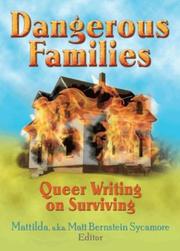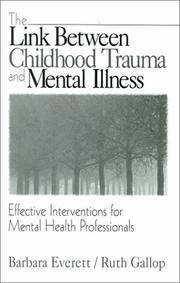| Listing 1 - 10 of 18 | << page >> |
Sort by
|
Book
ISBN: 9813362960 9813362952 Year: 2021 Publisher: Singapore : Palgrave Macmillan,
Abstract | Keywords | Export | Availability | Bookmark
 Loading...
Loading...Choose an application
- Reference Manager
- EndNote
- RefWorks (Direct export to RefWorks)
Adult child abuse victims --- Psychology. --- Adult survivors of child abuse --- Adults abused as children --- Child abuse survivors --- Child abuse victims, Adult --- Grown-up abused children --- Victims of crimes --- Abused children
Book
ISBN: 0987410482 Year: 2018 Publisher: [Place of publication not identified] : Woodslane Press,
Abstract | Keywords | Export | Availability | Bookmark
 Loading...
Loading...Choose an application
- Reference Manager
- EndNote
- RefWorks (Direct export to RefWorks)
This book has been specifically written to help, especially children, to be able to trust a 'safe' person when something wrong is happening in their life, be it bullying, improper touching by another person, sexual abuse, physical abuse - anything that is placing trauma in the child's life. Both the dialogue and the narrative are designed with the child in mind.
Book
ISBN: 9781788307345 1788307348 Year: 2020 Publisher: London Olympia Publishers
Abstract | Keywords | Export | Availability | Bookmark
 Loading...
Loading...Choose an application
- Reference Manager
- EndNote
- RefWorks (Direct export to RefWorks)
English literature --- Adult child abuse victims --- #SBIB:316.356.2H4531 --- #SBIB:316.356.2H4532 --- Adult survivors of child abuse --- Adults abused as children --- Child abuse survivors --- Child abuse victims, Adult --- Grown-up abused children --- Victims of crimes --- Abused children --- Rehabilitation --- Gezinsproblemen: vrouwenmishandeling en -verwaarlozing --- Gezinsproblemen: kindermishandeling en -verwaarlozing --- Wheels, Catherine.
Book
ISBN: 1283141515 1443824682 9786613141514 9781443824682 1443824003 9781443824002 9781283141512 6613141518 Year: 2010 Publisher: Newcastle upon Tyne Cambridge Scholars
Abstract | Keywords | Export | Availability | Bookmark
 Loading...
Loading...Choose an application
- Reference Manager
- EndNote
- RefWorks (Direct export to RefWorks)
The source of interpersonal psychological trauma is a traumatic event that is repetitive, chronic and complex in nature, and is caused by the action of a closely related person, most frequently in a dysfunctional and pathological family. This book presents studies on the influence of various forms of abuse experienced in childhood on the personal functioning of that individual in adulthood, including various types of symptoms, problems, and personality and neurobiological disorders. It also c...
Adult child abuse victims. --- Interpersonal relations --- Psychic trauma. --- Emotional trauma --- Injuries, Psychic --- Psychic injuries --- Trauma, Emotional --- Trauma, Psychic --- Psychology, Pathological --- Adult survivors of child abuse --- Adults abused as children --- Child abuse survivors --- Child abuse victims, Adult --- Grown-up abused children --- Victims of crimes --- Abused children --- Human relations --- Interpersonal relationships --- Personal relations --- Relations, Interpersonal --- Relationships, Interpersonal --- Social behavior --- Social psychology --- Object relations (Psychoanalysis) --- Psychological aspects.

ISBN: 0203057244 1283840154 1136572368 9781136572364 9780203057247 9781283840156 9781136572432 9781136572500 9781560234210 9781560234227 Year: 2004 Publisher: New York : Harrington Park Press,
Abstract | Keywords | Export | Availability | Bookmark
 Loading...
Loading...Choose an application
- Reference Manager
- EndNote
- RefWorks (Direct export to RefWorks)
Queer survivors piece together the clues to discover their own lives! Dangerous Families: Queer Writing on Surviving goes beyond the recovery narrative to create a new queer literature of investigation, exploration, and transformation. Twenty-six stories illuminate the reality of growing up in fear, struggling to rebuild lives damaged by sexual, physical, and/or emotional abuse. The book explores how abuse turns queer survivors?male, female, and transgendered?into healers, heartbreakers, and homicidal maniacs, presenting brilliant stories that sear and soar. Dangerous Families:
Adult child abuse victims --- Gays --- Adult children of dysfunctional families --- Sexual abuse victims --- Female sexual abuse victims --- Sexual violence victims --- Victims of sex crimes --- Victims of crimes --- Adult survivors of child abuse --- Adults abused as children --- Child abuse survivors --- Child abuse victims, Adult --- Grown-up abused children --- Abused children --- Dysfunctional families --- Gay people --- Gay persons --- Homosexuals --- Persons --- Family relationships --- Psychology. --- Family relationships.
Book
ISBN: 1634848004 9781634848008 9781634847858 Year: 2016 Publisher: New York
Abstract | Keywords | Export | Availability | Bookmark
 Loading...
Loading...Choose an application
- Reference Manager
- EndNote
- RefWorks (Direct export to RefWorks)
Child abuse and neglect (CAN) continues to be a serious public health problem in the United States, affecting approximately 19% of victims and costing approximately $124 billion to society. When a child is removed from their parent’s custody due to parental abuse or neglect, the child is sometimes placed in temporary custody through dependency court. Difficult and emotionally laden legal decisions occur within dependency court, including determining whether (and where) a child should be temporarily placed or whether a child should be returned to the parent’s custody. Over 6 million children experienced some type of child maltreatment in 2013, with 144,000 receiving foster care services (Child Maltreatment, 2013). Legal decision-makers, including judges, case workers, and social workers have the important task of determining what placement is in the best interest of the child. What factors shape decisions in child custodial cases? Chapter One of this book reviews empirical evidence suggesting that the race of the child and parent plays a role in shaping child custodial decisions. Chapter Two presents a feminist, social constructionist theoretical conceptualization, entitled relational trust theory, that describes the effects of gendered power dynamics on the perception of the other partner as trustworthy in adult-survivor couple interactions; and expounds on the findings of a longitudinal grounded theory study that identified clinical processes of Socio-Emotional Relationship Therapy (SERT) that helped adult-survivor couples transform their gendered power disparities and engage in relationally safe ways that supported a trusting emotional culture. Chapter Three provides a description of Parent-Child Interaction Therapy (PCIT), a rationale for its use with parents and children who have experienced CAN, and an overview of PCIT’s evidence base for both intervening with and preventing future CAN.
Child abuse --- Abused children --- Adult child abuse victims. --- Adult survivors of child abuse --- Adults abused as children --- Child abuse survivors --- Child abuse victims, Adult --- Grown-up abused children --- Victims of crimes --- Battered children --- Child abuse victims --- Maltreated children --- Victims of child abuse --- Children --- Adult child abuse victims --- Psychological aspects. --- Psychology.
Book
ISBN: 177133245X 1771332484 9781771332453 9781771332484 Year: 2015 Publisher: Toronto
Abstract | Keywords | Export | Availability | Bookmark
 Loading...
Loading...Choose an application
- Reference Manager
- EndNote
- RefWorks (Direct export to RefWorks)
Adult child sexual abuse victims --- Adult child abuse victims --- Adult survivors of child sexual abuse --- Adults sexually abused as children --- Child sexual abuse victims, Adult --- Sexual abuse victims --- Sexually abused children --- Adult survivors of child abuse --- Adults abused as children --- Child abuse survivors --- Child abuse victims, Adult --- Grown-up abused children --- Victims of crimes --- Abused children
Book
ISBN: 9780889773707 088977370X 9780889773691 0889773696 0889773688 9780889773684 Year: 2015 Publisher: Regina, Saskatchewan
Abstract | Keywords | Export | Availability | Bookmark
 Loading...
Loading...Choose an application
- Reference Manager
- EndNote
- RefWorks (Direct export to RefWorks)
"Now a retired fisherman and trapper, Merasty was one of an estimated 150,000 First Nations, Inuit, and Metis children who were taken from their families and sent to government-funded, church-run schools, where they were subjected to a policy of 'aggressive assimiliation.' As Merasty recounts, these schools did more than attempt to mold children in the ways of white society. They were taught to be ashamed of their native heritage and, as he experienced, often suffered physical and sexual abuse. Even as he looks back on this painful part of his childhood, Merasty's generous and authentic voice shines through."--From publisher.
Cree children --- Adult child abuse victims --- Adult survivors of child abuse --- Adults abused as children --- Child abuse survivors --- Child abuse victims, Adult --- Grown-up abused children --- Victims of crimes --- Abused children --- Children, Cree --- Children --- Merasty, Joseph Auguste. --- Merasty, Augie --- Merasty, Joseph A. --- Catholic priests abuse. --- TRC. --- reconciliation.

ISBN: 0761916989 0761916997 1322413509 1452221707 Year: 2001 Publisher: Thousand Oaks, Calif. : Sage Publications,
Abstract | Keywords | Export | Availability | Bookmark
 Loading...
Loading...Choose an application
- Reference Manager
- EndNote
- RefWorks (Direct export to RefWorks)
This practitioner orientated book offers a key to understanding and working with survivors of childhood trauma and abuse. It offers an approach which encourages professionals to connect clients' abusive pasts with present day behaviour.
Adult child abuse victims. --- Klinische psychologie --- specifieke problemen. --- Mental illness. --- Madness --- Mental diseases --- Mental disorders --- Disabilities --- Psychology, Pathological --- Mental health --- Adult survivors of child abuse --- Adults abused as children --- Child abuse survivors --- Child abuse victims, Adult --- Grown-up abused children --- Victims of crimes --- Abused children --- Adult child abuse victims --- Psychic trauma in children. --- Mental health. --- Child psychopathology
Book
ISBN: 9782363082855 2363082850 Year: 2022 Publisher: Paris Arléa
Abstract | Keywords | Export | Availability | Bookmark
 Loading...
Loading...Choose an application
- Reference Manager
- EndNote
- RefWorks (Direct export to RefWorks)
"Les grands bouleversements s’opèrent dans la légèreté. Comment oserions-nous sinon les affronter ?Seule l’écriture parvient à dire le chaos d’une enfance. Stéphane Lambert a dix ans lorsqu’un ami de la famille abuse de lui. Tout vole alors en éclats. Au hasard des jours, il se retrouve, trente ans plus tard, dans l’immeuble de son ancien abuseur. De là il remonte le fil de ce qu’on a voulu taire, en mesurant avec quelle force le passé imprégnait sa vie présente.Mais la dévastation peut aussi engendrer la beauté. Dans la solitude d’une île grecque, l’auteur apprend à surmonter ses peurs. Et quand survient la mort du père, c’est un homme serein qui y fait face. Car le temps du livre est celui de l’apaisement.L’apocalypse est heureuse."--
French literature (outside France) --- Authors, Belgian --- Adult child abuse victims --- Lambert, Stéphane, --- Childhood and youth. --- Family. --- Adult survivors of child abuse --- Adults abused as children --- Child abuse survivors --- Child abuse victims, Adult --- Grown-up abused children --- Victims of crimes --- Abused children --- Belgian authors --- Lambert, Stéphane
| Listing 1 - 10 of 18 | << page >> |
Sort by
|

 Search
Search Feedback
Feedback About UniCat
About UniCat  Help
Help News
News